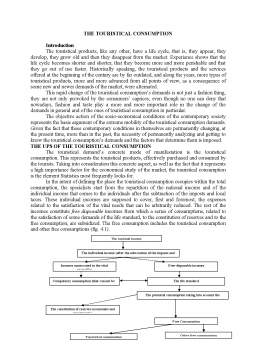Extras din referat
Introduction
The touristical products, like any other, have a life cycle, that is, they appear, they develop, they grow old and then they disappear from the market. Experience shows that the life cycle becomes shorter and shorter, that they become more and more perishable and that they go out of use faster. Historically speaking, the touristical products and the services offered at the beginning of the century are by far outdated, and along the years, more types of touristical products, more and more advanced from all points of view, as a consequence of some new and newer demands of the market, were alternated.
This rapid change of the touristical consumption’s demands is not just a fashion thing, they are not only provoked by the consumers’ caprices, even though no one can deny that nowadays, fashion and taste play a more and more important role in the change of the demands in general and of the ones of touristical consumption in particular.
The objective action of the socio-economical conditions of the contemporary society represents the basic argument of the extreme mobility of the touristical consumption demands. Given the fact that these contemporary conditions in themselves are permanently changing, at the present time, more than in the past, the necessity of permanently analyzing and getting to know the touristical consumption’s demands and the factors that determine them is imposed.
THE UPS OF THE TOURISTICAL CONSUMPTION
The touristical demand’s concrete mode of manifestation is the touristical consumption. This represents the touristical products, effectively purchased and consumed by the tourists. Taking into consideration this concrete aspect, as well as the fact that it represents a high importance factor for the economical study of the market, the touristical consumption is the element Statistics most frequently looks for.
In the intent of defining the place the touristical consumption occupies within the total consumption, the specialists start from the repartition of the national income and of the individual income that comes to the individuals after the subtraction of the imposts and local taxes. These individual incomes are supposed to cover, first and foremost, the expenses related to the satisfaction of the vital needs that can be arbitrarily reduced. The rest of the incomes constitute free disposable incomes from which a series of consumptions, related to the satisfaction of some demands of the life standard, to the constitution of reserves and to the free consumption, are subsidized. The free consumption includes the touristical consumption and other free consumptions (fig. 4.1).
Fig.4.1. The sources of the touristical consumption
K. Kraft, as a consequence of the increase rate analysis of the touristical consumption of a household with incomes that only come from salaries, concluded that the level of this rate depends on the expenses made for the compulsory consumption that attracts a relatively constant part of the income. If the part from the income allocated to the compulsory consumption is in decrease, then the free-disposable income will be bigger, and, therefore, the family’s expenses and disposability for holidays and spending the leisure will be higher.
Given the fact that under the conditions of the increase of the global individual income, the part of this one affected to vital necessities will be in decrease and, therefore, the part allocated to the touristical consumption will increase, having an elasticity superior to the unity.
The economist Engel, after he made an inquiry on the family budgets in 1875, concluded that between the level of the income and the level of the consumption there are some correlations determined by the size of the income. Thus, the following rapports can appear between the incomes and the consumption:
- a sub-unitary rapport when the increase of the income doesn’t carry on an increase of the consumption;
- an equal rapport with the unity when the increase of the income doesn’t carry on the same increase of the consumption;
- a supra-unitary rapport when a slight increase of the income determines an important increase of the consumption.
In the intent of substituting Engel’s laws, in our present day tourism, we can observe the following:
- for the prime necessity and alimentation consumption goods, the heft in the total income can decrease in general, but as these products cover a big volume of services and as the population’s tastes are more and more sophisticated, the choice’s elasticity for some products can be supra-unitary;
- touristical services don’t register an a lot bigger increase then the one of the incomes, but it is a very temperate one.
The factors that have direct and immediate consequences upon consumption refer to the economical recession phenomenon that regularly influences the consumption, and, first and foremost, the touristical one as well as the element called political atmosphere that plays an important role, especially for the evolution of the international tourism.
The touristical consumption doesn’t depend, nowadays, only on the family’s
Preview document
Conținut arhivă zip
- The Touristical Consumption.doc

















